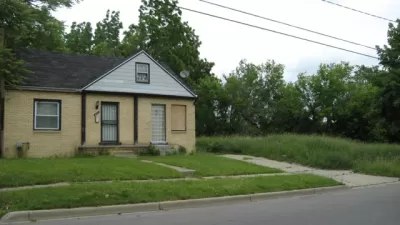Struggling cities are increasingly looking at the idea of bulldozing vacant properties and "shrinking". But two columnists argue it might not be such a good idea.
Writing for Citiwire, Roberta Brandes Gratz offers some historical perspective on clearance projects, arguing that few benefits are ever seen as a result.
"Granted some appealing urban gardens are now sprouting in these cities, where piles of debris might have accumulated. Clearly this is better than rubble-strewn lots.
But vast clearance? The fact is the presence of vacant buildings is nothing new in any of these cities; the condition in today's recession and industrial collapse is just worse. No citywide benefits ever materialized from mass demolition. And the big-bang projects that have sometimes risen where neighborhoods once stood– stadiums, arenas, convention centers, malls and the like - have not only failed in their promise and cost dearly but provided no fundamental basis for citywide resilience in good times or bad."
In the Los Angeles Times, Gregory Rodriguez says it's too short-sighted to give up on these cities.
"Sure, it is a given that cities -- like nations and civilizations -- rise and fall. We can find comfort in the fact that even as some U.S. cities decline, others thrive. And in the era of environmentalism and a romanticization of nature, the back-to-nature plan is certain to find a large degree of support. But in our rush to curb the excesses of industrialism and reduce our collective carbon imprint -- to "right size" -- I'm not sure we aren't undervaluing the role of cities in our society."
FULL STORY: Demolition a Wrong Answer For Imperiled Neighborhoods

Planetizen Federal Action Tracker
A weekly monitor of how Trump’s orders and actions are impacting planners and planning in America.

Map: Where Senate Republicans Want to Sell Your Public Lands
For public land advocates, the Senate Republicans’ proposal to sell millions of acres of public land in the West is “the biggest fight of their careers.”

Restaurant Patios Were a Pandemic Win — Why Were They so Hard to Keep?
Social distancing requirements and changes in travel patterns prompted cities to pilot new uses for street and sidewalk space. Then it got complicated.

Platform Pilsner: Vancouver Transit Agency Releases... a Beer?
TransLink will receive a portion of every sale of the four-pack.

Toronto Weighs Cheaper Transit, Parking Hikes for Major Events
Special event rates would take effect during large festivals, sports games and concerts to ‘discourage driving, manage congestion and free up space for transit.”

Berlin to Consider Car-Free Zone Larger Than Manhattan
The area bound by the 22-mile Ringbahn would still allow 12 uses of a private automobile per year per person, and several other exemptions.
Urban Design for Planners 1: Software Tools
This six-course series explores essential urban design concepts using open source software and equips planners with the tools they need to participate fully in the urban design process.
Planning for Universal Design
Learn the tools for implementing Universal Design in planning regulations.
Heyer Gruel & Associates PA
JM Goldson LLC
Custer County Colorado
City of Camden Redevelopment Agency
City of Astoria
Transportation Research & Education Center (TREC) at Portland State University
Camden Redevelopment Agency
City of Claremont
Municipality of Princeton (NJ)



























